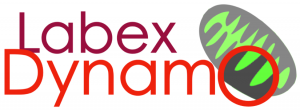About
The DYNAMO consortium, was created in March 2012, initially for an eight year duration, and was selected as one of a small number of French « Laboratories of Excellence (LABEX) in Life Sciences. The project was renewed in 2019 for a further five years. The consortium consists of the five CNRS research units located at the Instiut de Biologie Physico-Chimique in Paris, and two CNRS research units in chemistry, located at the College de France and Ecole Normale Supérieure-Ulm. The seven partners also are affilated either to university Paris Diderot, to University Pierre et Marie Curie or to University Paris-Sciences et Lettres.
The LabEx DYNAMO has both a scientific goal and a mission to train the next generation of young scientists emerging from its three umbreall universities/.
Science:
The scientific goal of DYNAMO is to increase our understanding of the biogenesis and function of energy transducing membranes in bacteria, chloroplasts and mitochondria. The current DYNAMO project is divided into three key research tasks:
- to study the evolution of energy – producing organelles from bacterial ancestors
- to study membrane dynamics and their regulation across evolution
- to study the supramolecular organisation of electron transfer
Training:
All 7 scientific partners of DYNAMO are affiliated with the CNRS but they also have ties with three different universities, Sorbonne Université, Université de Paris and Paris-Sciences-et-Lettres. This diversity in partnerships allows DYNAMO to provide a broad contribution to training at the frontiers of biology, physics and chemistry to hundreds of highly motivated students. These training opportunities have so far included 41 PhD/post-doc fellowships and a similar number internships for Masters students in the partner laboratories, dedicated training tracks in the DYNAMO research fields for some 150 Masters level students from the three umbrella universities and more than 15 workshops. DYNAMO provides its students with access to a theoretical and methodological training on subjects such as intracellular bioenergetics, molecular modelling, microbiology, photobiology, membrane biology and biomimetic chemistry. Partner laboratories of the LabEx host students and post-doctoral fellows who bring to this scientific project their creativity and enthusiasm for the challenges of bioenergetics, membrane dynamics and regulatory mechanisms of gene expression.
